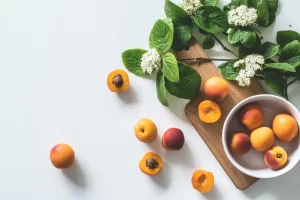Dietary sodium often consumed as common salt (sodium chloride) plays a key role in the body in regulating blood pressure but regularly consuming salt (through dishes, natural and processed foods) above 5g /day i.e. around one teaspoon a day is associated with hypertension. As salt is a high risk factor for hypertension, which is among the leading causes of deaths globally, it is important to make sure we do not exceed this recommended amount of salt. Below are 10 tips to help consume at most 5g/day of salt a day.
For everyone
- Use more natural spices such as ginger, garlic, chilli, rosemary, onions, African locust bean (‘dawadawa’), grains of Selim (‘hwentia’), prekese, ‘akokobesa’ among others to meet your taste preference instead of salt.
- Cut down and if possible avoid the use of processed spices such as cubes and seasoning powders because they often contain salt in high amounts.
- If you have to use salt in cooking, always measure. Do not pour directly into the dish being prepared using the eye as a regulator because you are likely to add more than is needed.
- In some countries such as Ghana, salted fish (‘koobi’, ‘momone’) and salted meat (salted pig feet, ‘kako’) are used in cooking. These are high in salt and should you need to use them then; soak them in water overnight before use, boil them in water before use and remember not to use the stock and use small quantities and/or do not add salt to the dish being prepared.
- Do not add salt to food at the table as it is injurious to health.
- Eat and/or use small quantities and if possible avoid processed food products such as processed meat (bacon, ham), crisps as they are high in salt.
- Read food labels to know the amount of salt (dietary sodium) contained in the food. On food labels, the salt in the food is captured as sodium (at most 2g of sodium intake per day).
For Parents
- Babies and children under 11 years require lower amounts of salt than the adults. Give your child(ren) a healthy start by
- Not adding salt or processed spices to meals being prepared for them as it can be injurious (their kidneys are not able to cope with high intake of salt) to their health. In other words prepare their meals separately.
- As salt habitation i.e. the association of salt to taste and hence preference for high salt food is developed during childhood, help kids not to develop a salt habitation by not giving them foods such as crisps
On Hypertension
Hypertension has no symptoms to help in early detection and treatment so;
- Regularly check your blood pressure. It should not be equal to or above140/90mmHg
- Hypertensive patients or people with high blood pressure should seek advice from a health professional as they require assistance (special diets, medication etc.). Let’s connect you to one of our professionals.
Take home message
‘Food taste’ is not equal to the salt in the food. Some naturally occurring foods, water, processed foods contain dietary sodium (salt), and all the salt you will consume in a day including such foods, should be at most 5g or around one teaspoon.
Join the Become A Healthier You community today and find support to eat healthier.
Related articles: Ways to cut down on fat intake, How to cut down on sugar intake
Written and reviewed by: Irene Danquah, ANutr
Last page review: 23/12/2021
Next page review: 31/12/2024


